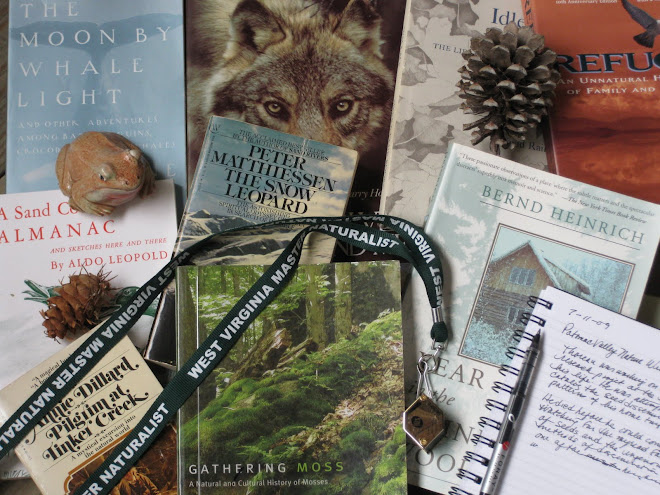Saturday, November 13, 2010
PVNWG MEETS DECEMBER 5 TO DISCUSS ANN PANCAKE WORK
Due to the holidays and other scheduling conflicts, PVNWG will meet December 5 at 2:00 PM at a member's home. The November selection, Strange As This Weather Has Been by Ann Pancake is the topic for discussion. New members who wish to attend the meeting should email pvnaturewriters@gmail for details.
Monday, November 1, 2010
ANN PANCAKE IS AUTHOR FOR NOVEMBER

Our group has selected a fiction work for November's read: award-winning West Virginia author Ann Pancake's Strange As This Weather Has Been.
The book dramatizes the impact of rapacious mining on the members of an Appalachian family, their land and their culture's place-based traditions. For information about the author and links to reviews, see Pancake's blog here. Read Pancake's short story "The End of the World in Slow Motion" online here
Read historical background for the book here
Date and place for November meeting TBA. (Now scheduled for December 5, see above post.)
Thoreau at the 'Pond"

Our October meeting on the afternoon of the 24th took place lakeside at Greenbrier State Park in Maryland, a fitting scene in which to share our thoughts on Thoreau and the fruits of his sojourn by Walden Pond. Glimmering curtains of autumn color, pure blue sky above, all mirrored by the calm eye of the water's expanse must have intoxicated us and loosened our tongues. Thoreau received quite an unrestrained critique. Perhaps we were also emboldened by the many years distancing us from this author and somehow perversely moved to demythologize his global reputation. "Holier than thou" and "hypocritical" were some of the words bandied about.
It is said that Thoreau wrote of self-reliance while trucking his laundry to his mother's home. He himself admits to borrowing an ax to chop trees for his cabin. Before conceiving his Walden project, Thoreau and a friend built a fire in a stump one day. The fire spread and numerous acres of the town's woodlots were burned. However, Thoreau scholars remind us that laundry in his time included few items, and laundry of a paupered would-be writer fewer still. Thoreau himself assures us he returned the ax to its owner sharper than when he borrowed it. And Thoreau forever rued his role in the destruction of the woods. Perhaps that incident even contributed to his subsequent living experiment.
On of the assumptions about Thoreau is that Walden is a tale of how he separated himself from society. On the contrary, the book frequently refers to his many visitors. It includes a whole chapter on the history of Concord and the surrounding countryside, gleaned from interviews with local folk. Thoreau studied human behavior, his own and that of others, just as much as the natural environment. He makes admiring as well as critical observations of people and their interactions with nature. He sees fishermen to be as fitting a subject for naturalist study as the the fish. He does have some cutting remarks on the fashions and ambitions of the day that can feel like a sharp poke in the ribs. There are many parallels between his time and ours, between us and him.
Our group remarked on the painstaking detail, with which he described natural phenomena. His description of the process of the Pond's water freezing at winter's onset runs on for pages. His command of the English language to paint pictures and voice subtle ideas made an impression on us--in these days of media-based education and electronics-obsessed youth. What message in his medium? We went off on a tangent bemoaning texting and twitterings. Without a cell phone or digital camera to distract, Thoreau used the artistry of words to explore within, to express and connect. If he lived today, what would Thoreau do? Reading him, we wonder, how should we live?
In Walden, homely explorations of bean-growing, plastering, fireplace-building and cooking are set against lofty philosophizing. As Thoreau lived on Walden Pond, nature and essential human doings are seamlessly interwoven. He brings the same attention and respect to chopping wood and carrying water, as he does to pondering the stars. As a seeker Thoreau is as human as any of us, he had foibles aplenty. But his short life and writings continue to inspire us. In the end, our group agreed that we need the mild wildness of Thoreau to wake us up from our routines. Walden bears reading not just every generation, but every decade. In each season of our lives, a dip in the waters of Walden will refresh.
Subscribe to:
Posts (Atom)

